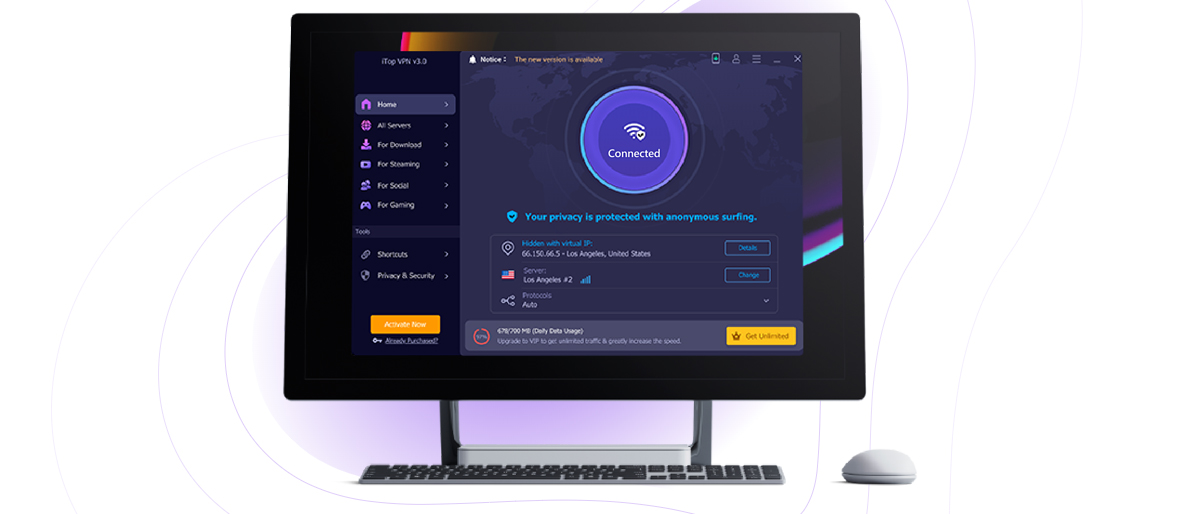Tom's Guide Verdict
If you're looking for a free service for non-critical tasks with a generous data cap, iTop VPN fits the bill. But, while the paid plans offer plenty of advanced functions, it's difficult to recommend thanks to a number issues we found with its basic features.
Pros
- +
Decent free plan
- +
Lots of added extras
- +
Long-term plans are cheap
- +
Can unblock BBC iPlayer and Disney+
Cons
- -
Can't access Netflix of Amazon Prime Video
- -
Kill switch isn't watertight
- -
Poor website security
- -
Doesn't disclose which protocols is uses
Why you can trust Tom's Guide
iTop VPN is best known as a free VPN provider, and compared to some of the competition, it's actually quite a generous service. For this review, though, we'll also be taking an in-depth look at iTop's paid plans, and the interesting extra features it has tucked away.
The free plan offers 700MB a day, which works out at 21GB a month – more than Hotspot Shield, but less than ProtonVPN's unlimited free plan.
Paying users will get 1,800+ servers spread across over 100 locations, which is a fairly decent range, with plenty of dedicated streaming and gaming servers, and a modest amount of P2P locations.
As standard you'll get split tunneling, iTop's Security Reinforce features (more on that later), plus tools for blocking malware, ads, and trackers.
To jump to any section of our iTop VPN review, click on the navigation bar at the top of the page. Otherwise, just keep scrolling to see if iTop VPN can really challenge the best VPN services on the market.
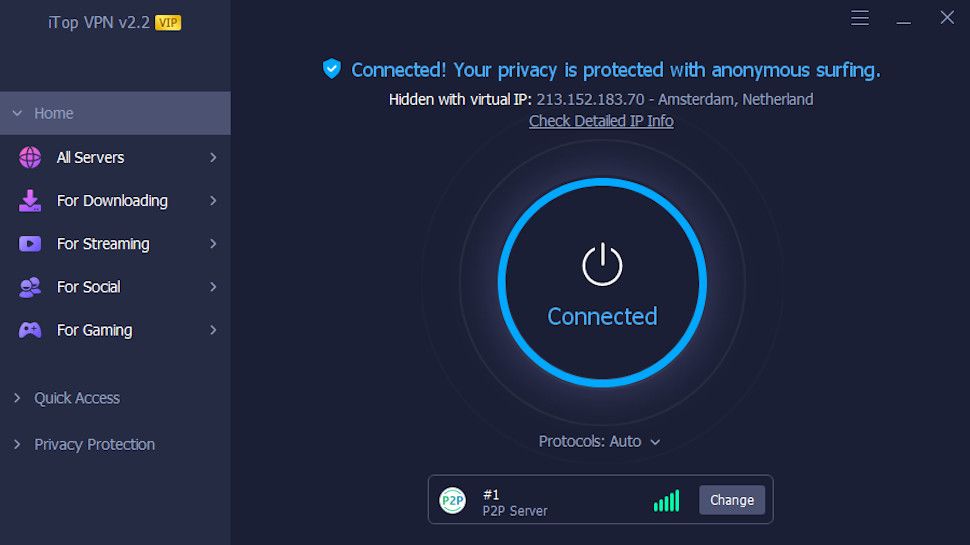
iTop VPN price: how much is it, and is there a iTop VPN free trial?
Sign up for a single month with iTop VPN and it'll cost your $11.99. That's quite expensive, but not quite the highest price we've seen.
As always, longer plans work out much cheaper. Sign up for 12 months and you'll pay $4.17 a month. Again, that's not extortionate for a mid-length plan, it's still not exactly what we'd call a cheap VPN.
Things get a lot more attractive when you look at the 2-year plan (marketed at the time of writing as a Black Friday VPN deal with 6 months free). That brings the price down to a very reasonable $2.31 a month, which is up there with some of the cheaper services available like Surfshark ($2.49 a month) and Private Internet Access ($2.03 a month).
You can pay with PayPal, card, and bank transfer, and auto-renewal can be disabled at this stage so you can avoid being billed again at the end of your plan should you want to change provider.
Finally, you'll get a 15-day money-back guarantee on longer plans (not as generous as the standard 30 days), or 7 days if you go for the monthly VPN plan.
How private is iTop VPN, and does it keep logs?
VPN protocols are at the heart of every single VPN service, and determine how your data is trransferred, and how it's encrypted to keep you safe. Most providers use OpenVPN and WireGuard – both trusted and open source – alongside others, but iTop seems to stray away from the norm.
Instead of using one of the tried-and-true protocols, iTop apparently sends your data through a proxy connection to the VPN server, encrypting it with its own custom protocol.
While custom protocols aren't necessarily bad – ExpressVPN's Lightway and Hotspot Shield's Catapult Hydra are two trusted examples – iTop doesn't give us any extra information at all on what the protocol is doing, or how it has been designed. It might be fine, but we simply can't tell.
Also, when were signing up to the service, iTop requested our name, city and ZIP code, which all seems pretty unnecessary since we'd already handed over our email.
Finally, iTop's website has a privacy issue of its own. Thanks to a poorly configured SSL certificate, we were able to access certain parts of the site while using unencrypted HTTP. That puts us at risk, and really not good form for a product whose one job is to encrypt data.
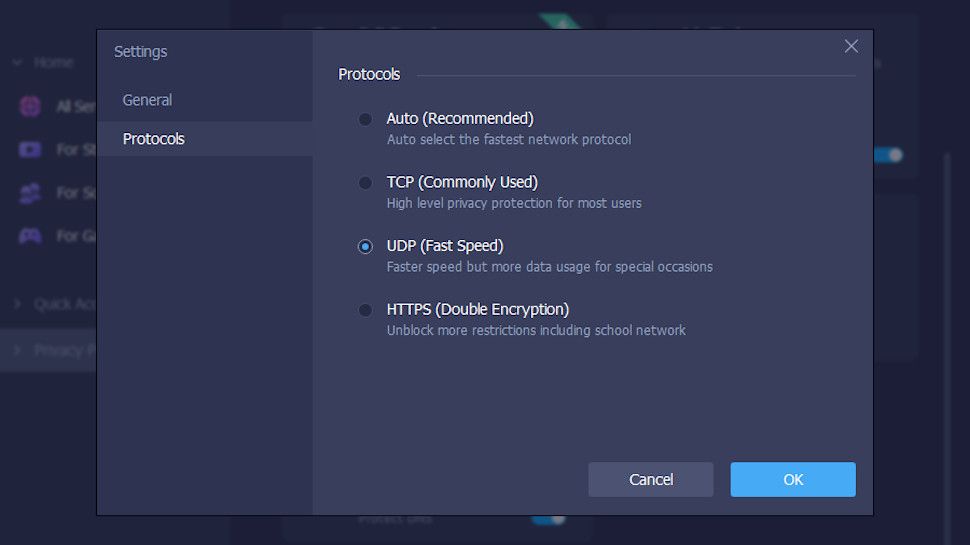
Does iTop VPN keep logs?
iTop claims to be a zero-logging VPN provider, and it tries to back this up in its privacy policy.
It claims: 'We do not log your activity while you are utilizing the Services, including your browsing history, the bandwidth you used, or how long you connected to VPN servers. We do not store your original IP address or the server IP address that you connect to.'
However, thanks to the data limit on the free plan, this is impossible – bandwidth and device ID logs would be essential to achieve this.
Further down the page, we discover that iTop VPN collects 'operating system, device ID, Internet protocol addresses, browser type, browser language, referring/exit pages, clickstream data of our websites and our products or services, and the pages or features of our software or services accessed by you and the time spent there.'
While a lot of that could be to do with the website and not the apps themselves, it's not entirely clear – and clarity is essential when it comes to VPN privacy policies.
Finally, iTop hasn't undertaken any kind of independent audit of its policy, servers, or apps, so while we don't have any concrete reason to distrust these claims, we do have to take the company's word for it.
How fast is iTop VPN?
No one wants to deal with sluggish Internet speeds, and great performance is often at the top of most people's shopping lists when it comes to picking a VPN. We tested iTop VPN in the UK and US on 1Gbps connections to see what it can really offer.
In the UK, we saw pretty standard speeds of 180-190Mbps. That shouldn't slow you down, but it's by no means a fast VPN. However, in the US iTop perked up a bit, delivering speeds of 360-400Mbps. We even saw one test reach a massive 900Mbps, but this wasn't repeatable and was dismissed as an outlier.
Compared to other VPNs using OpenVPN, that's quite impressive – ProtonVPN reached 460Mbps, while top-rated provider ExpressVPN only just cracked 300Mbps.
However, compared to those services using WireGuard or other next-gen protocols, iTop lags behind. ExpressVPN's Lightway hit around 600Mbps, and others like NordVPN and IPVanish broke 800Mbps.
It's also worth noting that we can't tell exactly what protocol iTop VPN is using here. When we test just about every other VPN, we know that while OpenVPN speeds might be a little slow, we're still fully encrypted and safe. With iTop, who knows what it's doing (or not doing) in the name of better speeds?
How good is iTop VPN for streaming and torrenting?
Having a streaming VPN is important for many users, so it's a big part of what we test.
When we tried to access BBC iPlayer with iTop, we were pleasantly surprised, and we got in straight way. We had the same result from Disney+, with the dedicated servers in New York and Los Angeles.
However, we weren't able to access Netflix, even when we used the dedicated servers, and Amazon Prime Video was also a no-go.
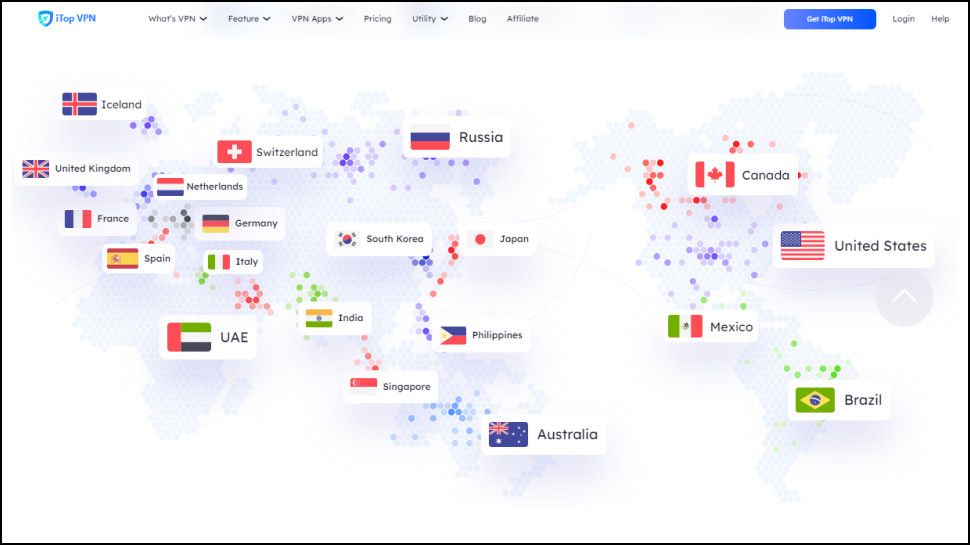
How good are iTop VPN's desktop apps?
Good app design is important, and while iTop's Windows VPN app isn't awful and offers some very interesting features, the basics have been neglected.
Take the server list, for example. Most VPNs order their servers in some logical way – perhaps alphabetically, or by ping time. Not here, though. iTop seemingly has no order to its servers, and although there is a search bar, it's not logical in the lsightest. You also don't get a Favorites or Recents tab, so you'll have to either search every time, or memorize that mixed-up list.
Also, when you hit the big ol' on/off button, you'd expect to be connected to a local server. Nope – from our UK base we were connected to Japan, and then Germany. Hardly ideal.
The good news is that iTop offers dedicated servers for a lot of different activities. There are options for Netflix, Disney+, PUBG, WhatsApp, Facebook, and a huge amount more. The quick access pane also allows you to connect to a number of preset server selections to take the fuss out.
So, those features are smart, but in truth we would far prioritize a simple, effective and logical layout and feature-set rather than and somewhat half-hearted main product with lots of bells and whistles tacked on.
How good are iTop VPN's mobile apps?
On iOS, iTop's app is about as basic as you can get – it's quite literally an on/off button, a drop-down for protocol selection, and a location list. It doesn't even have a settings menu.
Android is much the same, although you get split tunneling, and a list of servers that's in a different order from both iOS and desktop. Not a biggie, but if you use it across different devices, it could get annoying.
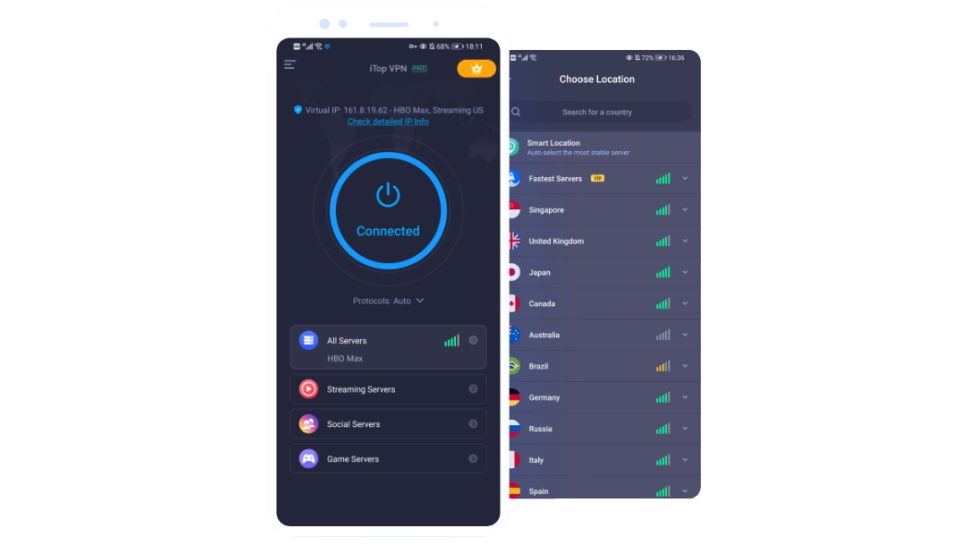
What extra features does iTop VPN offer?
For the desktop apps, there's a remarkable amount of stuff to run through here.
To start off, you'll get a kill switch. In our testing this worked most of the time, although it did fail when we deliberately crashed the app. We also didn't get a notification that this had happened, so we could've been exposed unwittingly if this had happened in real life.
You'll get split tunneling which works as it should, directing your browser traffic, for example, through the VPN while leaving the rest untouched.
DNS Protection can help to protect your DNS settings from outside modification. You'll also be able to choose from a number of public DNS providers like Google, Verizon, OpenDNS and more.
One feature that's missing is auto-connection on insecure Wi-Fi. Most VPNs offer this now, so it's a surprising omission.
Security Reinforce is an interesting addition, however. It will scan your PC for non-optimal security settings in other apps, and will flag these so you can adjust them. All the advice it gave was good, and it's a very useful feature.
Finally, Browser Privacy is another nice feature with can automatically clean up your browser,
While all these features might be useful, some aren't necessarily what you need in a VPN – but it's nice to see them. However, we'd definitely prioritize basic app features over these.
iTop VPN review: Final verdict
With tons of extra features that advanced users will get a kick out of, iTop is a pretty powerful VPN, and its free option is worth considering. However, for those looking for true online privacy, we can't recommend the service thanks to its untestable and undisclosed protocols – and while the apps are powerful, they lack the polish and entry-level usability we've come to expect from modern VPNs.

Mo is VPN editor at Tom's Guide. Day-to-day he oversees guides on the best VPNs, privacy, and cybersecurity content, which includes making sure all his recommendations are up to date, accurate, and as useful for the reader as possible. He's a daily VPN user himself – typically NordVPN, but he enjoys a variety – and as a digital privacy advocate he believes that every step should be taken to protect yourself online.
